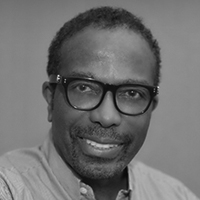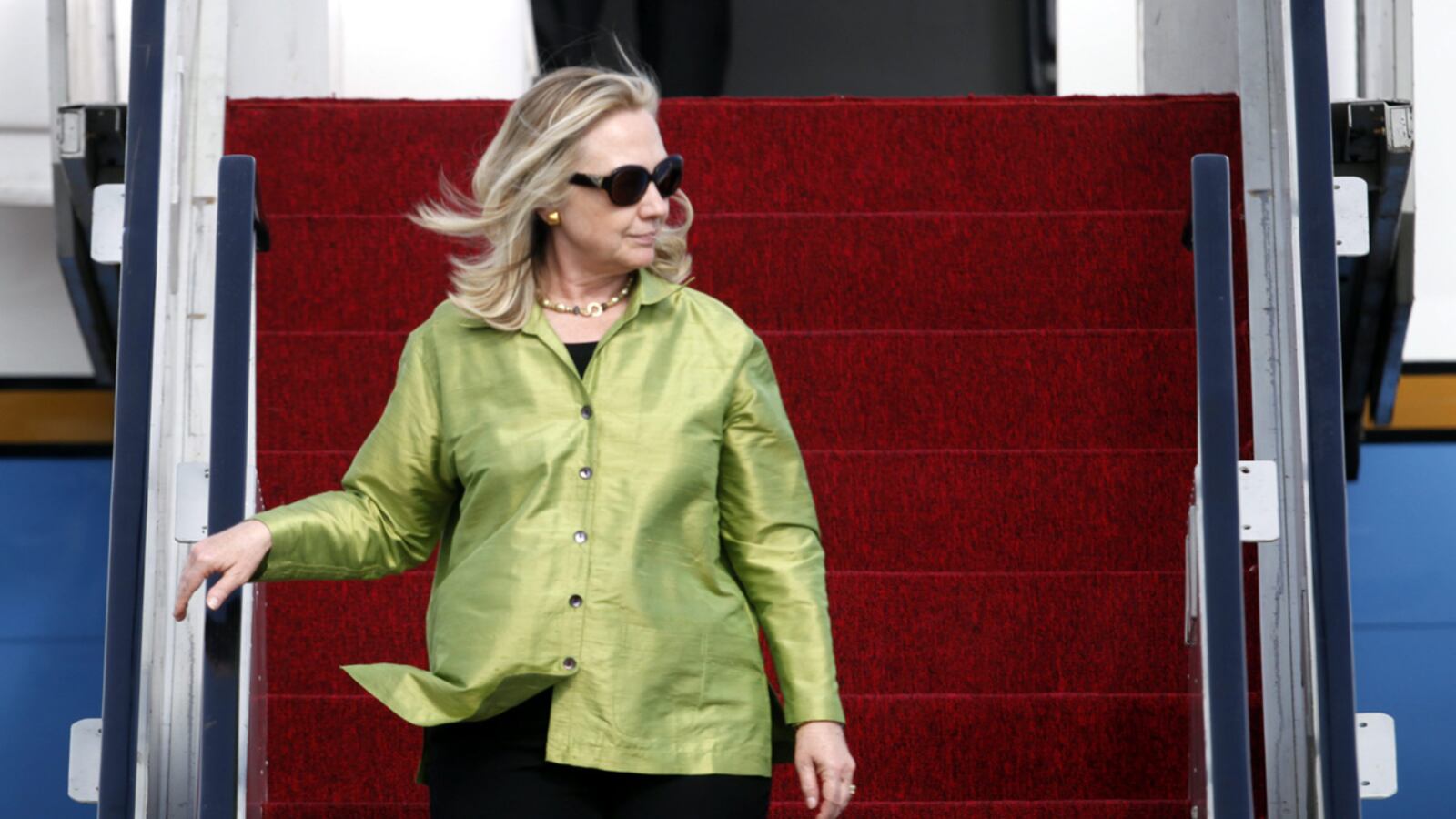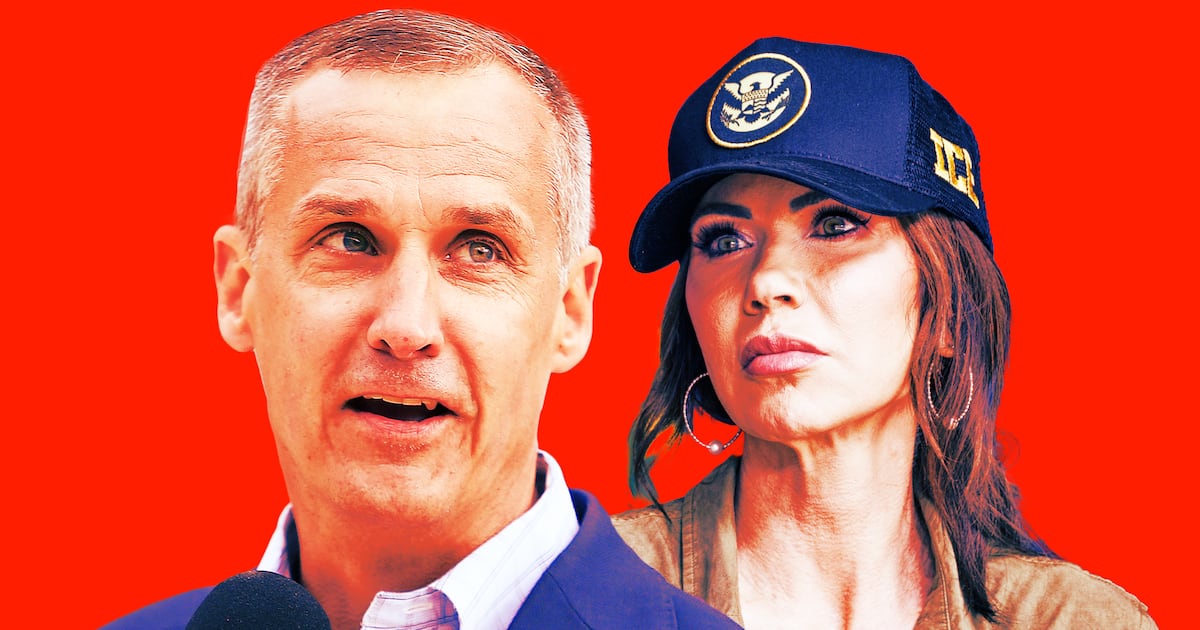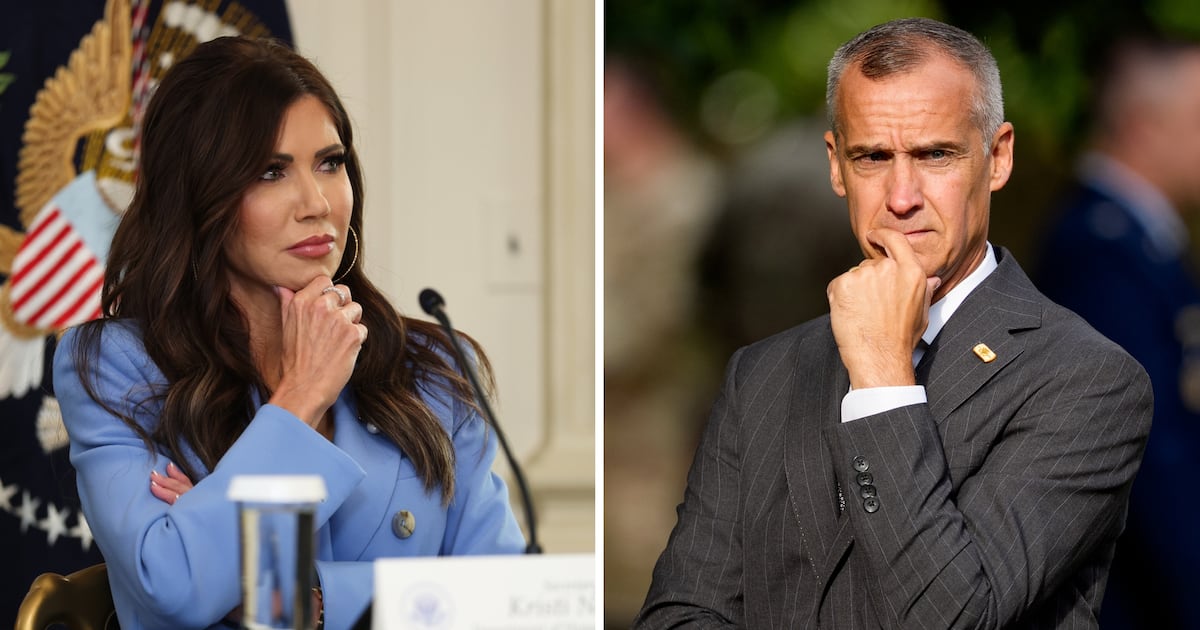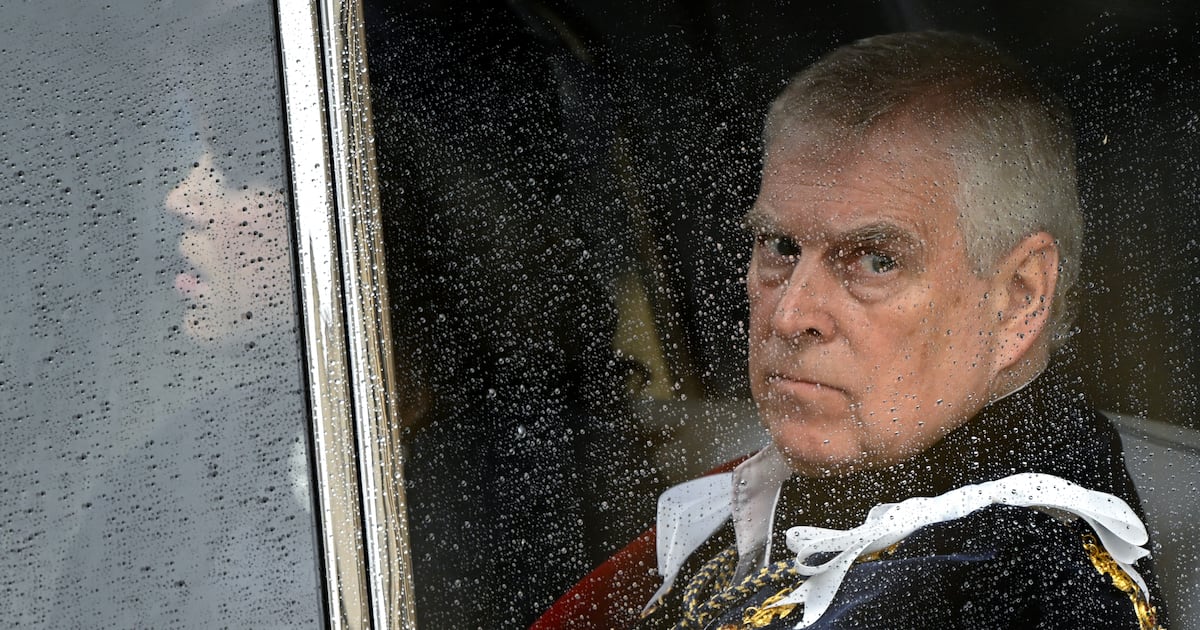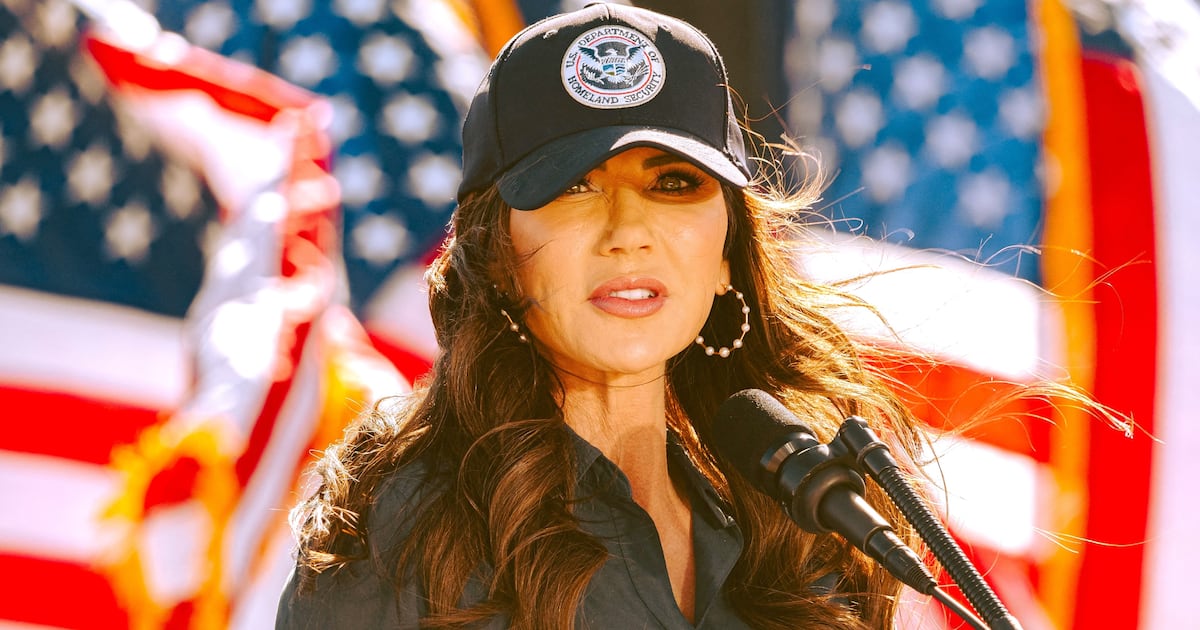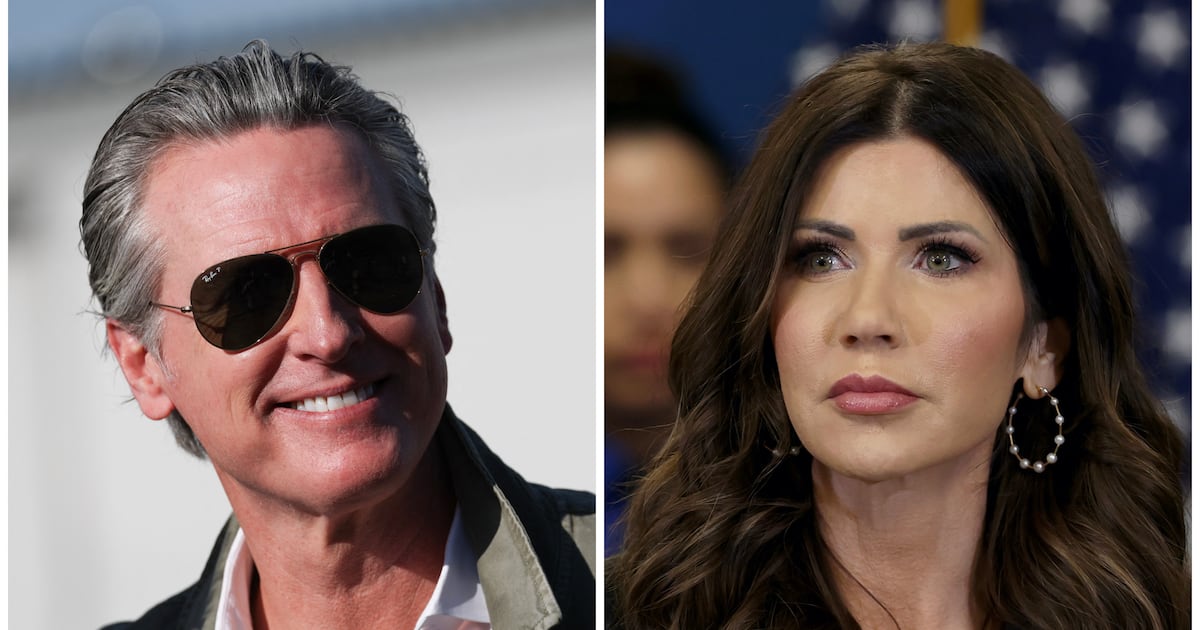Hillary Clinton arrives in Burma on Dec. 1 for a two-day official visit, the first by a U.S. secretary of state in 50 years—and part of an attempt by President Obama to test whether incipient signs of loosening in Rangoon amount to more than public relations.
When an election a year ago brought Burma a civilian government, long-suffering opposition groups, disillusioned expatriate activists, and the world at large assumed the military generals who have been in power for decades would continue to pull the strings behind a veneer of “democracy,” and stick to their brutal, authoritarian practices. But the new government has made dramatic—by Burmese standards—moves, releasing legendary activist Aung San Suu Kyi from years of house arrest, and setting free more than 200 political prisoners.
Last week was momentous in the country’s makeover effort: In addition to Obama’s announcement of the Clinton visit, the 10-member ASEAN—the Association of Southeast Asian Nations—agreed to let Burma chair the organization in 2014. Moreover, Suu Kyi declared that the new government was one she could deal with—and told throngs of supporters that she and her National League for Democracy would re-register as a political party and stand for elections.

Such developments can go a long way toward bringing the country out of seclusion, but how far is the government of President Thein Sein prepared to go—and more important, how much change are the generals willing to countenance? Discussing the “historic opportunity” for Clinton’s visit, Obama spoke of “flickers of progress” in Burma. The president, however, is not necessarily expecting major dividends from the trip. And neither is Clinton. She told Fox News her visit will involve “fact-finding” as well as diplomacy. “We’re not ending sanctions. We’re not making any abrupt changes,” she told the network.
The mood among veteran Burma critics can best be described as watchful—with some guardedly optimistic, and others skeptical.
“There’s reason to be cautiously optimistic these days because of the U.S. involvement and the ASEAN decision,” Burmese journalist and analyst Aung Zaw told The Daily Beast. “There are small concessions being made by the government. There is a general acknowledgement among the ruling class, whether openly or in secret, that they have to moderate. They’re reaching for modest reform, trying to reintegrate into ASEAN, and repair relations with the West, particularly the United States. With the U.S. as a roadblock, Burma can’t get any better or go anywhere. ”
In an editorial, The Irrawaddy, an influential magazine run by Burmese expats in Chiang Mai, Thailand, said it is time for Thein Sein to prove skeptics wrong. The publication described Burma’s ASEAN chairmanship as “welcome news,” and added that “hopefully being given the chair will result in better behavior by the Burmese leaders than in the past.” Irrawaddy noted: "It became an open secret that Burma’s current leaders wanted to repair their strained relations with Washington and put some breathing space between themselves and China.”
Aung Zaw and others say Rangoon may be realizing that it cannot rely on China, its biggest supporter and benefactor, indefinitely, to the exclusion of regional neighbors and the West, including Britain, the former colonial power, and Washington. Beijing has routinely thwarted efforts to punish the junta’s miserable human-rights record, repression of its own citizens, and persecution of ethnic minorities such as the Shan and Karen peoples. But China’s back-stopping has done little to end the sanctions against the regime or bring respectability to the government.
Obama may well have concluded that Rangoon is interested in reassessing its longstanding relationship with Beijing, which has been the staunchest defender of the repressive regime that has been in place in Burma since the 1960s, headed by a changing cabal of iron-fisted—and corrupt—generals. Just this past September, Thein Sein halted work on Burma’s controversial Myitsone hydroelectric dam, shocking China, which was backing the project, and delighting environmentalists and democracy activists. The Burmese leader said the project was “against the will of the people”—a startling comment from rulers who hitherto had shown no interest in anyone’s will but their own. The action also suggested an unusual willingness to go against Beijing, a signal welcomed by Western analysts—and politicians.
The political and personal fortunes of Aung San Suu Kyi, Burma’s best-known—and most beloved—democracy icon, is likely to be the best barometer for gauging how serious the government is about changing the political landscape. Days after the Nov. 7 election that delivered Thein Sein the presidency, Suu Kyi was released from house arrest. She had been under house arrest for some 15 of the 21 years between 1989 and 2010.
Her party, the NLD, refused to participate in the 2010 election, saying—with considerable justification—that it would be rigged. Many Burmese are heartened to now hear her describe Thein Sein as reasonable, honest, even worthy of some trust. Her acolytes figure that if she is saying real change appears in the offing, then perhaps it is.
But for some, the government’s moves remain suspect—and Suu Kyi a tool in the campaign to achieve legitimacy for Rangoon.
“Honestly, we are very doubtful,” Than Khe, chairman of the All Burma Students’ Democratic Front, told The Daily Beast. “There are still many inside Burmese jails. Still a lot of government troops persecuting people, especially in the ethnic areas. There is still a crisis in the country. The 2010 election was unilateral; many groups were excluded. As far as we are concerned, they [the government] have to prove their legitimacy.
“Aung San Suu Kyi may be right, but we are very concerned about her, because this government can manipulate her to gain legitimacy. It’s too early to talk about any change in Burma. For the government that has been losing face inside Burma and internationally, they’re very happy about this Clinton trip.”
Indeed, Thein Sein’s administration has been virtually beaming over such a high-level visit. “I think it is a significant turn in U.S. policy toward Myanmar [Burma],” Thein Sein adviser Ko Ko Hlaing crowed to Reuters. “People in Myanmar will welcome, cheer Hillary Clinton because for a time in history they have never seen a secretary of state.”
Clinton is expected to press for the release of more political prisoners—even though Burmese governments have long insisted there are no such people in the country—progress on human-rights abuses, and better treatment of ethnic minorities. But what will she actually get? Probably promises to work on all those points, analysts say.
“I don’t think she’ll come away empty-handed,” said Aung Zaw. “She’ll leave with some concessions, probably the release of some more prisoners. That would go a long way toward repairing U.S.-Burmese relations. And there have been credible reports that she will get some assurances on the Shan and other ethnic minorities.”
Not that Aung Zaw or anyone else is expecting a sudden rush toward full democracy. “Burma will remain authoritarian, and the military will continue to play the leading role,” he said. “They’re not going to leave tomorrow.”
They surely won’t. The military has 25 percent of the seats in Parliament, and as open as he may now appear, Thein Sein is part of a military club that has ruled Burma for decades. And he was one of the most trusted aides of Than Shwe, the erratic junta strongman who stepped down earlier this year. Clinton will likely keep in mind that while her host now wears dapper business suits, for years he walked around in the uniform of a feared general.
